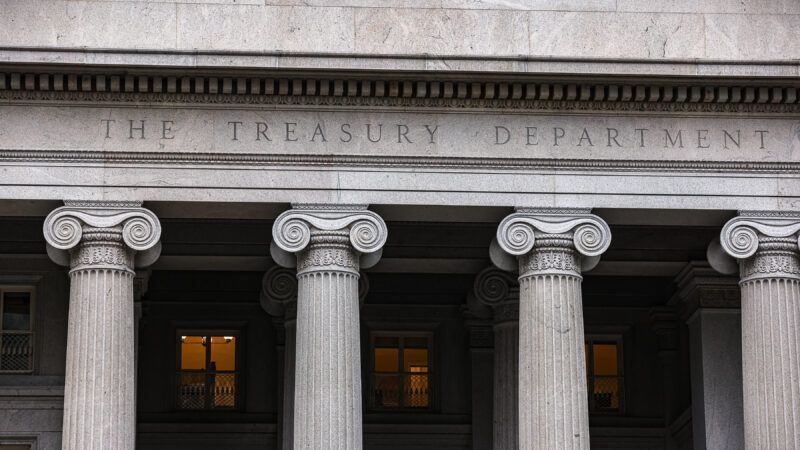The Feds' Chinese Investment Ban Will Harm America, Not China
The Treasury's sweeping rule curtailing dual-use technology transactions with Chinese firms will reduce domestic growth, innovation, and security.

The Treasury's Office of Investment Security (OIS) is set to publish its final rule restricting U.S. investments in certain technologies in China and other covered countries this week, reports Reuters. OIS's proposed rule is overly inclusive in its covered transactions and would threaten American competitiveness and national security.
OIS's advance notice of proposed rulemaking cites President Biden's August 2023 Executive Order and the International Emergency Economic Powers Act to justify its authority to curtail the investments of all citizens, permanent residents, and entities organized under U.S. jurisdiction. The Legal Information Institute explains that the act does grant the executive branch the power to "investigate, regulate, or prohibit any transactions in foreign exchange" after declaring a national emergency. But just because the government can do something doesn't mean it should.
Perpetually declaring a national emergency to use expanded executive authority to enact substantive policy is an ironic, ineffective way of responding to an authoritarian regime. If Congress believes the U.S. is imperiled by certain American investments, then legislators should pass a law prohibiting them and be evaluated by their constituents at the ballot box.
Back to reality. The purpose of the rule is two-fold: first, to identify categories of prohibited transactions, which are those that pose "a particularly acute national security threat because of [their] potential to significantly advance the military, intelligence, surveillance, or cyber-enabled capabilities of a country of concern"; second, to identify categories of notifiable transactions, which are those that "may contribute to the threat to the national security of the United States identified in the Order."
The rule identifies three categories of transactions that are notifiable or prohibited: semiconductors and microelectronics, quantum information technologies, and AI systems. Each of these categories comprises dual-use technology: the same product can be used for commercial and military purposes. Just as fission can power a town or level it with a thermonuclear explosion, a semiconductor can be used to run a PlayStation or a ballistic missile system.
The proposed rule doesn't just ban quantum sensors, networking, and communications systems intended for "military, government intelligence, or mass-surveillance end use" but all "front-end semiconductor fabrication equipment designed for performing the volume fabrication of integrated circuits" as well as "equipment for performing volume advance packaging."
The rule also uses the broad definition of "artificial intelligence" provided by President Biden's October 2023 Executive Order, "Safe, Secure, and Trustworthy Development and Use of Artificial Intelligence." In his March 2024 testimony before the House Subcommittee on Cybersecurity, Information Technology, and Government Innovation, Neil Chilson, head of AI policy at the Abundance Institute, describes the EO's definition as a "vague and over-inclusive" one that "includes far more software than the large language models or 'generative AI' tools." Given the rule's use of such an all-encompassing definition of AI, it's unlikely that only AI with military end uses will be regulated.
The Semiconductor Industry Association, an advocacy organization whose membership includes Intel, IBM, AMD, and Nvidia, warns "U.S. chip companies will be at a significant competitive disadvantage vis-à-vis foreign competitors, while the targeted sectors in countries of concern might not be adversely affected." The Business Roundtable, a nonprofit lobbyist association representing CEOs, also argues that the rule "will capture a significant number of investments in commercial applications that do not have potential or actual national security risks." But it's not just industries and lobbyists who object to the rule on economic grounds.
Economist Christine McDaniel, director of the international trade program at the Mercatus Center, highlights two additional costs in her comments on the Treasury's proposed rule: forgoing 9.1 percent rates of return on outward direct investment, and diminished domestic employment, sales, R&D and capital expenditures, and exports. Moreover, McDaniel explains that "the costs of the rule will exceed its benefits" due to increased direct and indirect compliance costs.
The rule aims to protect American national security by slowing the development of military applications of Chinese computation through its rule. However, imposing onerous compliance costs and export controls on U.S. firms will not stop foreign companies from investing in China. Instead, it will hamper American innovation and economic growth while China continues developing next-generation technologies. The best way to counter Chinese dominance is not protectionism, but via free market competition, investment, and innovation.


Show Comments (20)